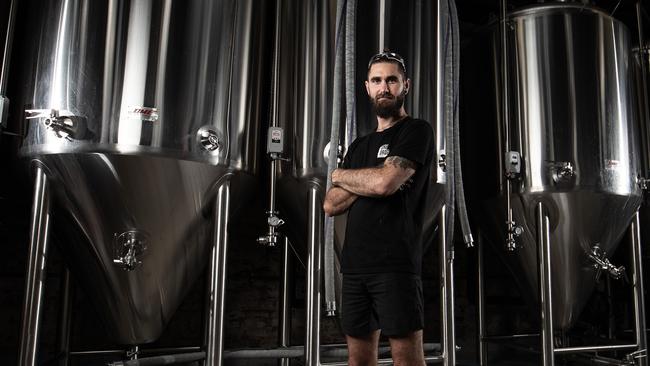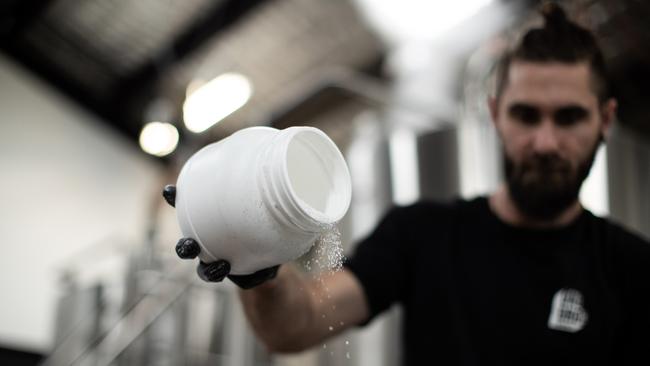Doing the pandemic pivot: how fast changing businesses are surviving COVID-19
The ways people have pivoted their core enterprises since COVID-19 put a brake on business are astounding.

What’s your pivot? Not long ago that question might have been heard in downtown San Francisco, where founders met venture capitalists over a soy latte. Today it’s bandied around radio stations, Zoom meetings and distanced walks throughout Australia.
The concept of the pivot — often described as planting one foot on something solid and moving the other to change direction — may not be widely known here, but in the past month it has been practised by millions of Australians and their businesses.
The ways people have pivoted their core enterprises since COVID-19 put a brake on business are astounding. There was the stage builder who lost all festival bookings overnight and set up a few days later as a desk builder for home offices; the gin distillers turned hand-sanitiser makers; the wedding planner who set up an online channel for teaching makeup tips; the nappy company that started making face masks; clothing companies that switched to personal protective equipment; cafes that became gourmet goods shops; and the restaurants that reinvented their menus for home delivery.
In careers too, millions have done the pivot. Obviously, office workers overnight became home workers, juggling video meetings, Lego and a spouse for lunch. Schoolteachers became online educators; personal trainers became online instructors; gyms sent their equipment home with clients; performers went online; choirs and reading rooms went live via screens; the Sydney Opera House became a streaming platform; and comedian Hamish Blake offered to drop in on your Zoom Friday drinks. Management, too, did a crash course in the distributed workforce. Suddenly it had hundreds of far-flung people to manage. The hierarchy flattened as decisions went down the line and trust in staff replaced control.

The past month may seem like the maddest scramble in business history, but it could be seen as the month Silicon Valley arrived in everyone’s workplace.
The pivot was crucial to the history and success of many technology giants. YouTube launched as a video dating service; Twitter was a platform for sharing podcasts; Netflix was a DVD mail order company; Slack began as a video game and Groupon was a fundraiser for social ventures.
In the textbooks of tech history, the pivot was about chasing a better business opportunity based on lessons learnt from earlier iterations, whereas the pivots that we’re doing are about escaping a market that just disappeared. But the principles are the same.
The pivot requires agility and, in this crisis, that means recognising that your market has disappeared, identifying where new needs are and determining the skills that can be used for those new needs. In the case of the stage builder, they had skilled carpenters and designers and a workshop for production.
But other Silicon Valley tools have helped many to pivot. One is technological advances such as 3-D printing that, say, allow the maker of prosthetic devices to switch from fake hands to face shields.
-
Even a month ago, few would have imagined how they would be working, what they would be creating, who their customers would be and who they would be working with
-
The tools of open source and collaboration have also become crucial. This is most obvious in the quest for a vaccine that has bound scientists together around the world as they share genome sequences, swap studies months ahead of publication and collaborate for clinical trials. But small businesses also have thrown out competitive instincts by sharing recipes for sanitisers, templates for products and plugging holes in each other’s supply chains.
The final lesson from the Valley is the concept of frictionless delivery. If you need to catch up with the team, drop them a line to join a video meeting. If you want to avoid contact, drop the home-delivered meal at the front door. If you want to order a package of essential groceries, just press the Essentials button.
If the favourite aphorism of the Valley is fail fast, fail often and fail forward, then Australians have proven themselves masters. Even a month ago, few would have imagined how they would be working, what they would be creating, who their customers would be and who they would be working with.
Of all the lessons from this time of pandemic, the speed of change might be the greatest — meetings, plans and permissions were thrown out in the name
of survival. It’s an experience that will be remembered in post-pandemic times and may form a template for future business. We’ve learnt a lot about our ability to change, how skills can be deployed, how old barriers can be demolished overnight and how hierarchies can be flattened in the service of a flat curve. We’re all entrepreneurs now. We’re all in Silicon Valley now.






To join the conversation, please log in. Don't have an account? Register
Join the conversation, you are commenting as Logout